
sparql-llm
🦜✨ Chat system and reusable components to improve LLMs capabilities when generating SPARQL queries
Stars: 63
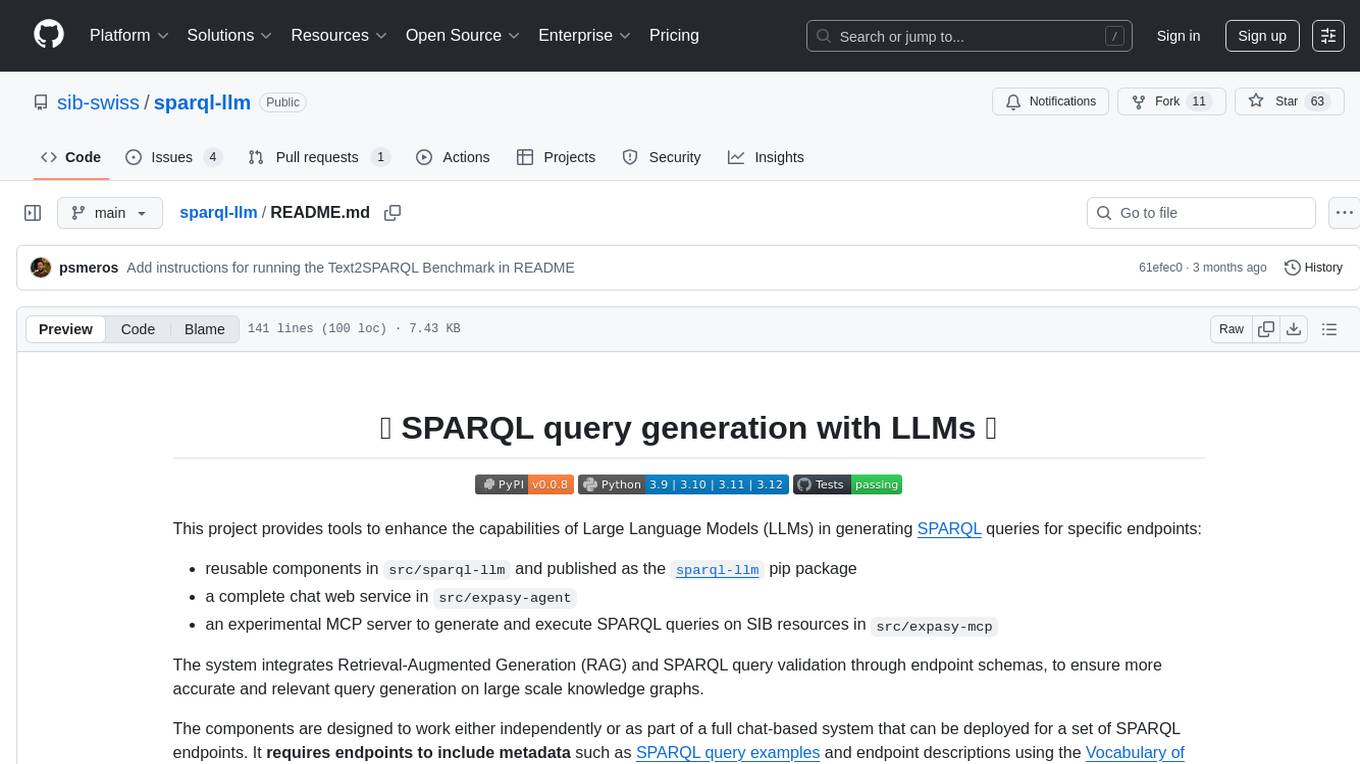
This project provides tools to enhance the capabilities of Large Language Models (LLMs) in generating SPARQL queries for specific endpoints. It includes reusable components, a chat web service, and an experimental MCP server. The system integrates Retrieval-Augmented Generation (RAG) and SPARQL query validation through endpoint schemas to ensure accurate query generation on large-scale knowledge graphs. Components can work independently or as part of a chat-based system requiring endpoint metadata. Features include metadata extraction, SPARQL query validation, deployable chat system, and live example chat system at chat.expasy.org.
README:
This project provides tools to enhance the capabilities of Large Language Models (LLMs) in generating SPARQL queries for specific endpoints:
- reusable components in
src/sparql-llmand published as thesparql-llmpip package - a complete chat web service in
src/expasy-agent - an experimental MCP server to generate and execute SPARQL queries on SIB resources in
src/expasy-mcp
The system integrates Retrieval-Augmented Generation (RAG) and SPARQL query validation through endpoint schemas, to ensure more accurate and relevant query generation on large scale knowledge graphs.
The components are designed to work either independently or as part of a full chat-based system that can be deployed for a set of SPARQL endpoints. It requires endpoints to include metadata such as SPARQL query examples and endpoint descriptions using the Vocabulary of Interlinked Datasets (VoID), which can be automatically generated using the void-generator.
- Metadata Extraction: Functions to extract and load relevant metadata from SPARQL endpoints. These loaders are compatible with LangChain but are flexible enough to be used independently, providing metadata as JSON for custom vector store integration.
- SPARQL Query Validation: A function to automatically parse and validate federated SPARQL queries against the VoID description of the target endpoints.
- Deployable Chat System: A reusable and containerized system for deploying an LLM-based chat service with a web UI, API, and vector database. This system helps users write SPARQL queries by leveraging endpoint metadata (WIP).
- Live Example: Configuration for chat.expasy.org, an LLM-powered chat system supporting SPARQL query generation for endpoints maintained by the SIB.
[!TIP]
You can quickly check if an endpoint contains the expected metadata at sib-swiss.github.io/sparql-editor/check
Checkout the src/sparql-llm/README.md for more details on how to use the reusable components.
There is a step by step tutorial to show how a LLM-based chat system for generating SPARQL queries can be easily built here: https://sib-swiss.github.io/sparql-llm
[!WARNING]
To deploy the complete chat system right now you will need to fork/clone this repository, change the configuration in
src/expasy-agent/src/expasy_agent/config.pyandcompose.yml, then deploy with docker/podman compose.It can easily be adapted to use any LLM served through an OpenAI-compatible API. We plan to make configuration and deployment of complete SPARQL LLM chat system easier in the future, let us know if you are interested in the GitHub issues!
Requirements: Docker, nodejs (to build the frontend), and optionally uv if you want to run scripts outside of docker.
-
Explore and change the system configuration in
src/expasy-agent/src/expasy_agent/config.py -
Create a
.envfile at the root of the repository to provide secrets and API keys:CHAT_API_KEY=NOT_SO_SECRET_API_KEY_USED_BY_FRONTEND_TO_AVOID_SPAM_FROM_CRAWLERS LOGS_API_KEY=SECRET_PASSWORD_TO_EASILY_ACCESS_LOGS_THROUGH_THE_API OPENAI_API_KEY=sk-proj-YYY GROQ_API_KEY=gsk_YYY HUGGINGFACEHUB_API_TOKEN= TOGETHER_API_KEY= AZURE_INFERENCE_CREDENTIAL= AZURE_INFERENCE_ENDPOINT=https://project-id.services.ai.azure.com/models LANGFUSE_HOST=https://cloud.langfuse.com LANGFUSE_PUBLIC_KEY= LANGFUSE_SECRET_KEY=
-
Optionally, if you made changes to it, build the chat UI webpage:
cd chat-with-context npm i npm run build:demo cd ..
You can change the UI around the chat in
chat-with-context/demo/index.html -
Start the vector database and web server locally for development, with code from the
srcfolder mounted in the container and automatic API reload on changes to the code:docker compose -f compose.dev.yml up
- Chat web UI available at http://localhost:8000
- OpenAPI Swagger UI available at http://localhost:8000/docs
- Vector database dashboard UI available at http://localhost:6333/dashboard
In production, you will need to make some changes to the
compose.ymlfile to adapt it to your server/proxy setup:docker compose up
All data from the containers are stored persistently in the
datafolder (e.g. vectordb indexes) -
When the stack is up you can run the script to index the SPARQL endpoints from within the container (need to do it once):
docker compose exec api uv run src/expasy_agent/indexing/index_resources.py
[!WARNING]
Experimental entities indexing: it can take a lot of time to generate embeddings for millions of entities. So we recommend to run the script to generate embeddings on a machine with GPU (does not need to be a powerful one, but at least with a GPU, checkout fastembed GPU docs to install the GPU drivers and dependencies)
docker compose -f compose.dev.yml up vectordb -d cd src/expasy-agent VECTORDB_URL=http://localhost:6334 nohup uv run --extra gpu src/expasy_agent/indexing/index_entities.py --gpu &Then move the entities collection containing the embeddings in
data/qdrant/collections/entitiesbefore starting the stack
There is a benchmarking scripts for the system that will run a list of questions and compare their results to a reference SPARQL queries, with and without query validation, against a list of LLM providers. You will need to change the list of queries if you want to use it for different endpoints. You will need to start the stack in development mode to run it:
uv run --env-file .env src/expasy-agent/tests/benchmark.pyIt takes time to run and will log the output and results in
data/benchmarks
Follow these instructions to run the Text2SPARQL Benchmark.
If you reuse any part of this work, please cite the arXiv paper:
@misc{emonet2024llmbasedsparqlquerygeneration,
title={LLM-based SPARQL Query Generation from Natural Language over Federated Knowledge Graphs},
author={Vincent Emonet and Jerven Bolleman and Severine Duvaud and Tarcisio Mendes de Farias and Ana Claudia Sima},
year={2024},
eprint={2410.06062},
archivePrefix={arXiv},
primaryClass={cs.DB},
url={https://arxiv.org/abs/2410.06062},
}For Tasks:
Click tags to check more tools for each tasksFor Jobs:
Alternative AI tools for sparql-llm
Similar Open Source Tools

sparql-llm
This project provides tools to enhance the capabilities of Large Language Models (LLMs) in generating SPARQL queries for specific endpoints. It includes reusable components, a chat web service, and an experimental MCP server. The system integrates Retrieval-Augmented Generation (RAG) and SPARQL query validation through endpoint schemas to ensure accurate query generation on large-scale knowledge graphs. Components can work independently or as part of a chat-based system requiring endpoint metadata. Features include metadata extraction, SPARQL query validation, deployable chat system, and live example chat system at chat.expasy.org.
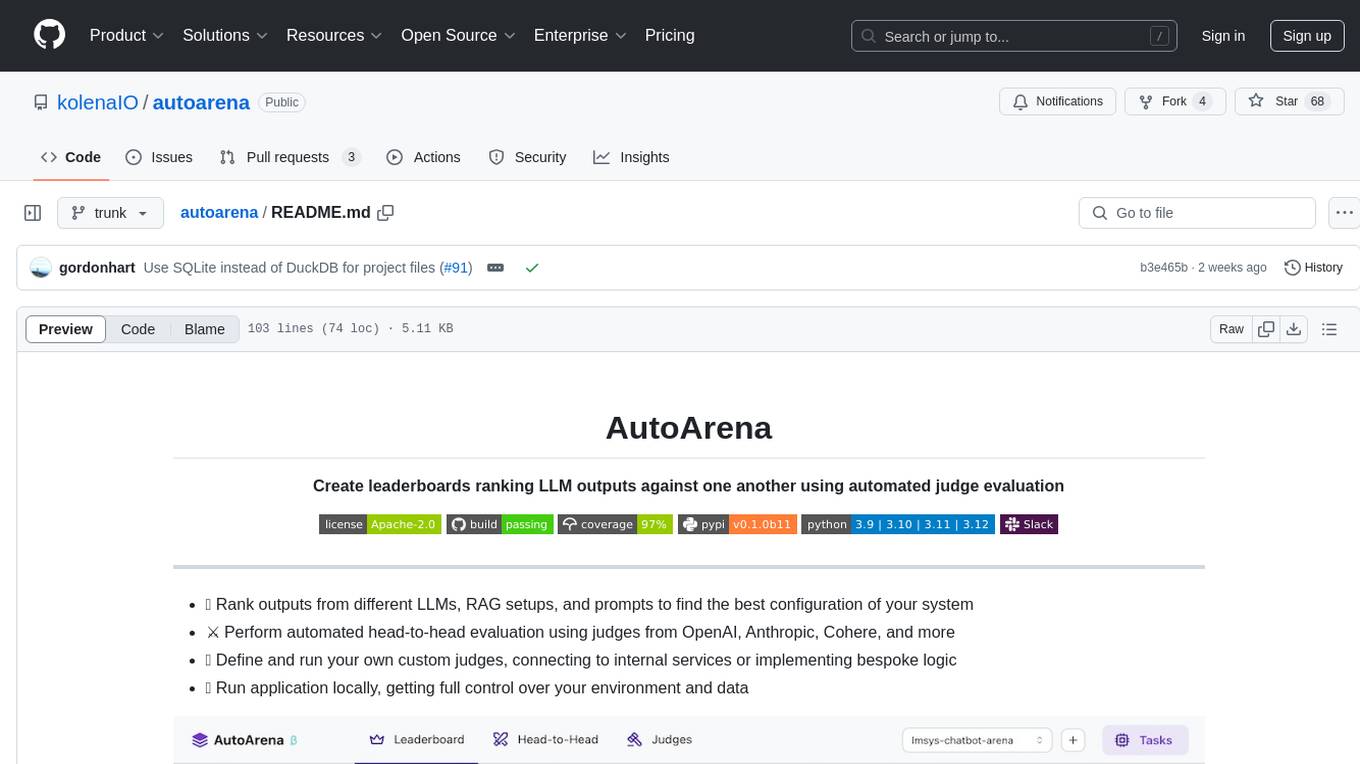
autoarena
AutoArena is a tool designed to create leaderboards ranking Language Model outputs against one another using automated judge evaluation. It allows users to rank outputs from different LLMs, RAG setups, and prompts to find the best configuration of their system. Users can perform automated head-to-head evaluation using judges from various platforms like OpenAI, Anthropic, and Cohere. Additionally, users can define and run custom judges, connect to internal services, or implement bespoke logic. AutoArena enables users to run the application locally, providing full control over their environment and data.
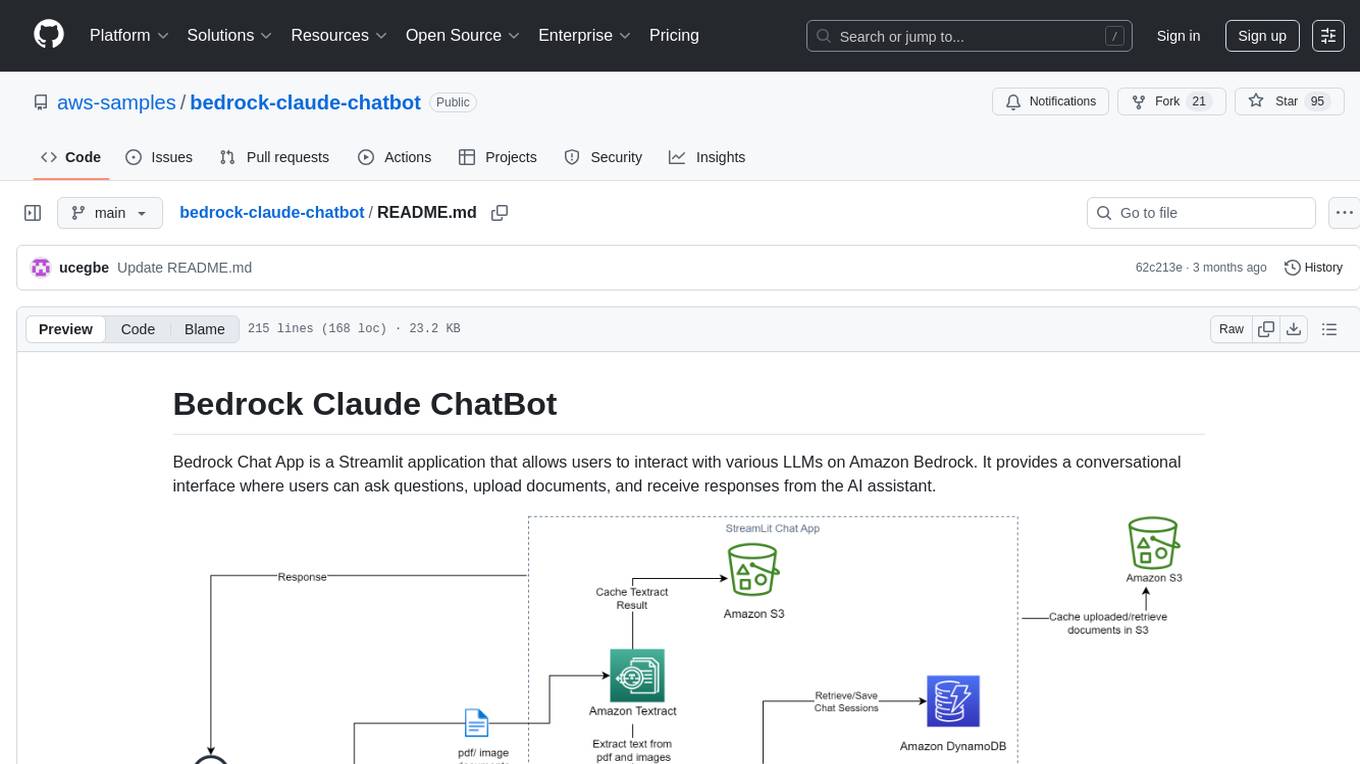
bedrock-claude-chatbot
Bedrock Claude ChatBot is a Streamlit application that provides a conversational interface for users to interact with various Large Language Models (LLMs) on Amazon Bedrock. Users can ask questions, upload documents, and receive responses from the AI assistant. The app features conversational UI, document upload, caching, chat history storage, session management, model selection, cost tracking, logging, and advanced data analytics tool integration. It can be customized using a config file and is extensible for implementing specialized tools using Docker containers and AWS Lambda. The app requires access to Amazon Bedrock Anthropic Claude Model, S3 bucket, Amazon DynamoDB, Amazon Textract, and optionally Amazon Elastic Container Registry and Amazon Athena for advanced analytics features.
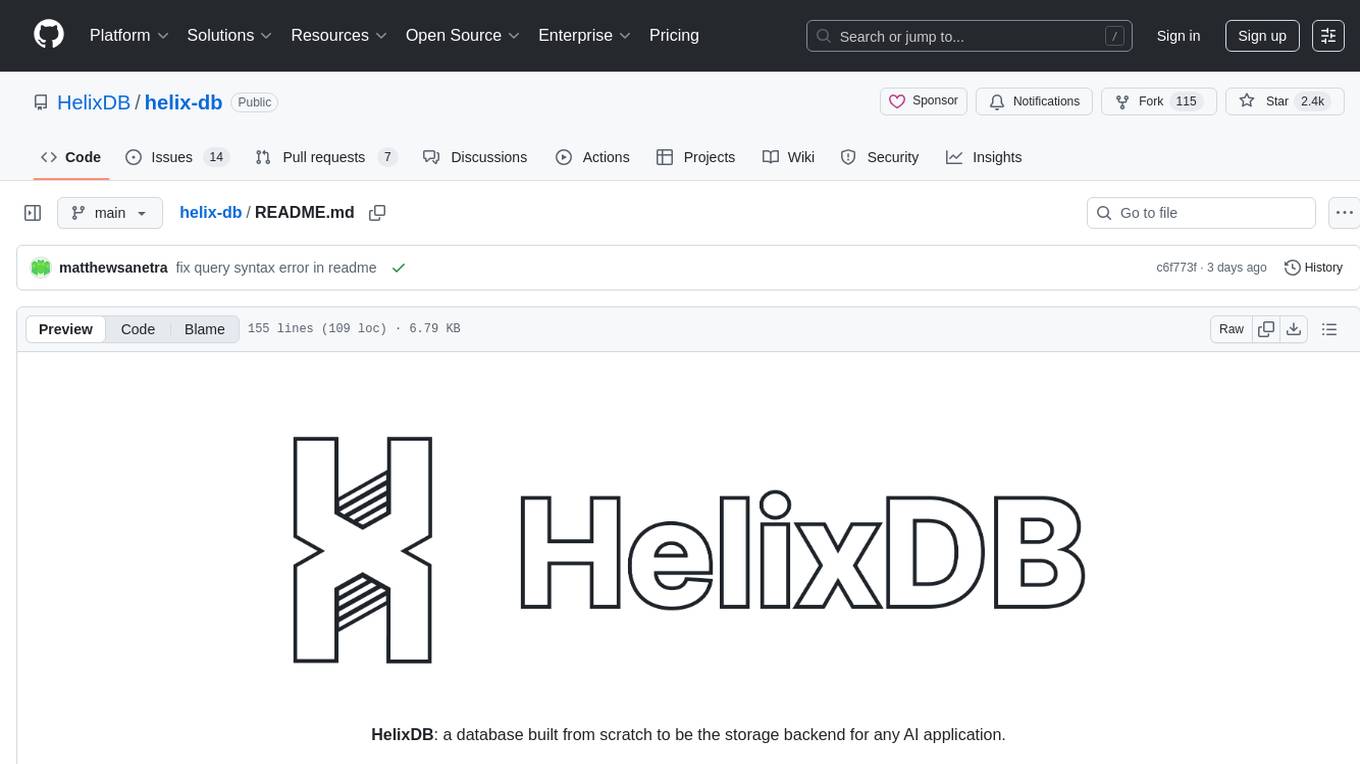
helix-db
HelixDB is a database designed specifically for AI applications, providing a single platform to manage all components needed for AI applications. It supports graph + vector data model and also KV, documents, and relational data. Key features include built-in tools for MCP, embeddings, knowledge graphs, RAG, security, logical isolation, and ultra-low latency. Users can interact with HelixDB using the Helix CLI tool and SDKs in TypeScript and Python. The roadmap includes features like organizational auth, server code improvements, 3rd party integrations, educational content, and binary quantisation for better performance. Long term projects involve developing in-house tools for knowledge graph ingestion, graph-vector storage engine, and network protocol & serdes libraries.
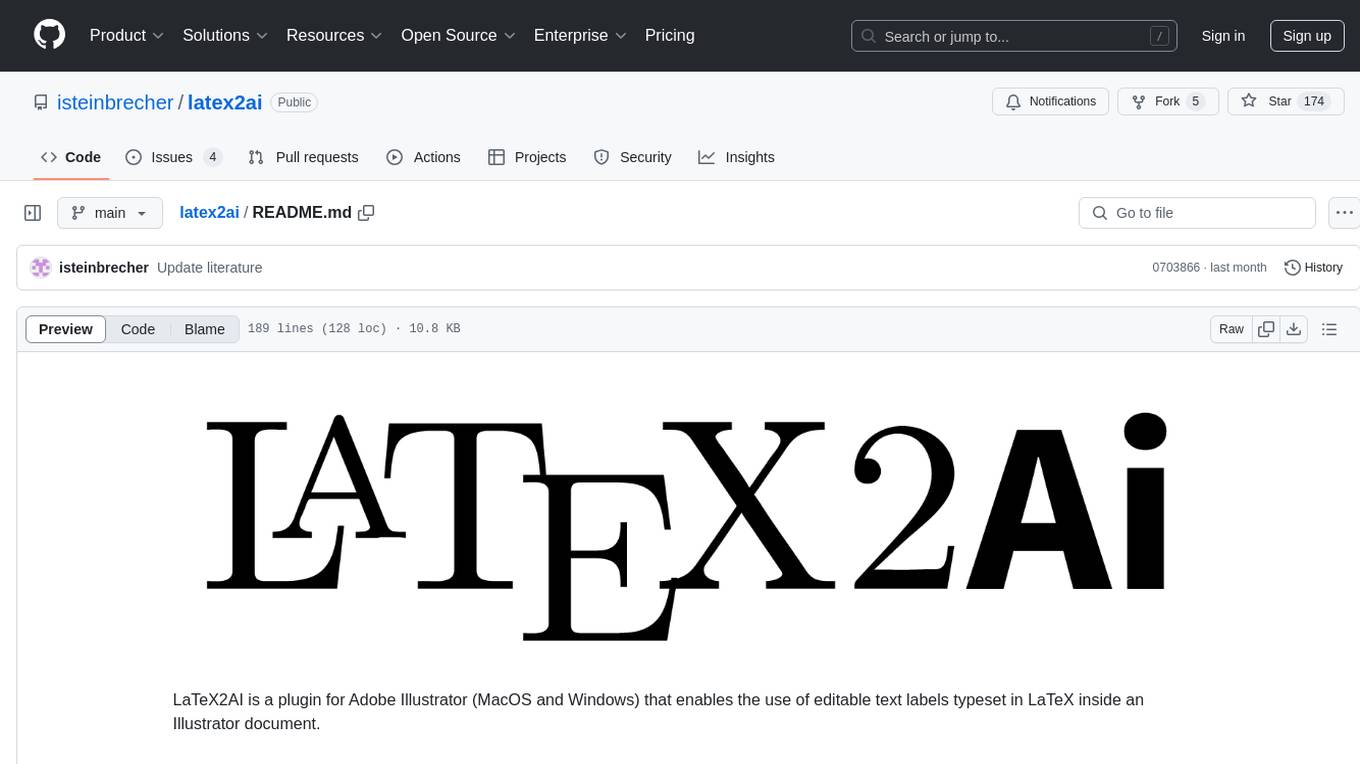
latex2ai
LaTeX2AI is a plugin for Adobe Illustrator that allows users to use editable text labels typeset in LaTeX inside an Illustrator document. It provides a seamless integration of LaTeX functionality within the Illustrator environment, enabling users to create and edit LaTeX labels, manage item scaling behavior, set global options, and save documents as PDF with included LaTeX labels. The tool simplifies the process of including LaTeX-generated content in Illustrator designs, ensuring accurate scaling and alignment with other elements in the document.
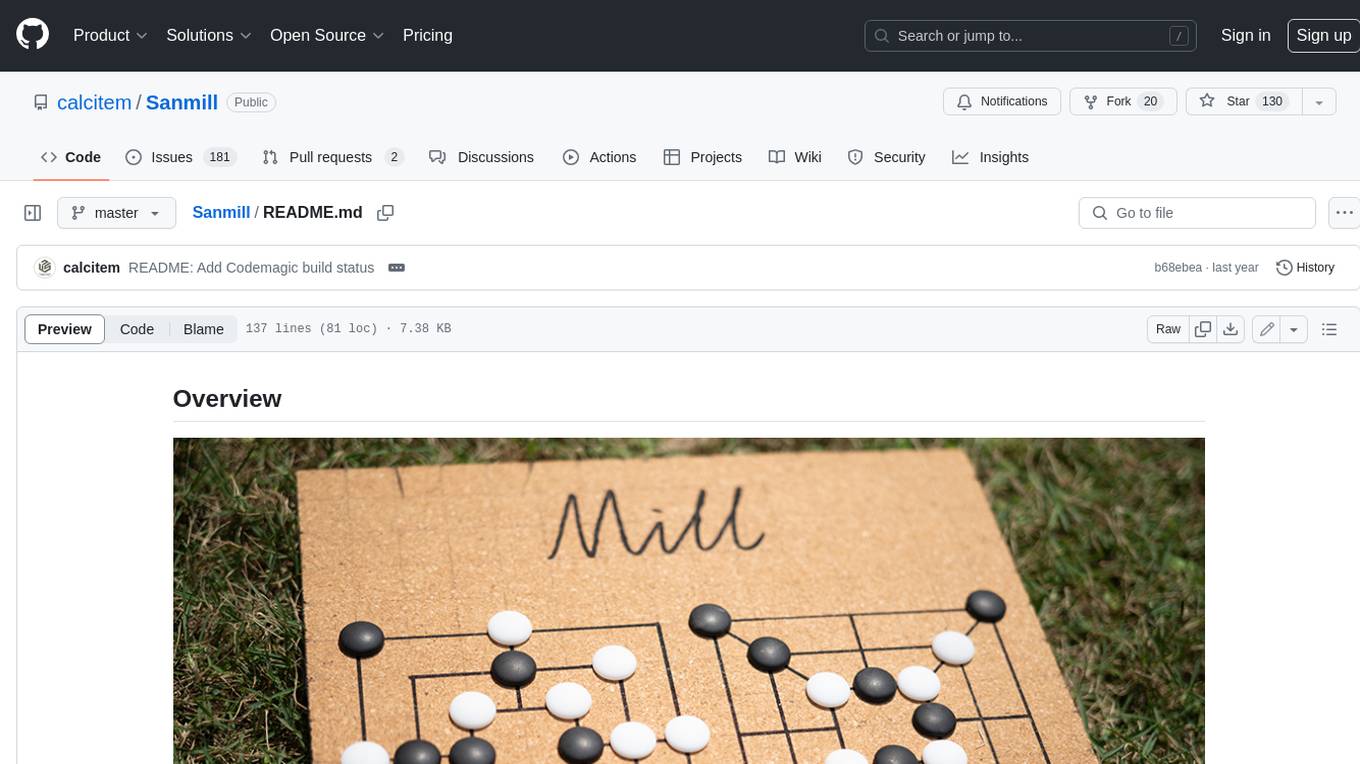
Sanmill
Sanmill is a free, powerful UCI-like N men's morris program with CUI, Flutter GUI and Qt GUI. Nine men's morris is a strategy board game for two players dating at least to the Roman Empire. The game is also known as nine-man morris , mill , mills , the mill game , merels , merrills , merelles , marelles , morelles , and ninepenny marl in English.

mosec
Mosec is a high-performance and flexible model serving framework for building ML model-enabled backend and microservices. It bridges the gap between any machine learning models you just trained and the efficient online service API. * **Highly performant** : web layer and task coordination built with Rust 🦀, which offers blazing speed in addition to efficient CPU utilization powered by async I/O * **Ease of use** : user interface purely in Python 🐍, by which users can serve their models in an ML framework-agnostic manner using the same code as they do for offline testing * **Dynamic batching** : aggregate requests from different users for batched inference and distribute results back * **Pipelined stages** : spawn multiple processes for pipelined stages to handle CPU/GPU/IO mixed workloads * **Cloud friendly** : designed to run in the cloud, with the model warmup, graceful shutdown, and Prometheus monitoring metrics, easily managed by Kubernetes or any container orchestration systems * **Do one thing well** : focus on the online serving part, users can pay attention to the model optimization and business logic
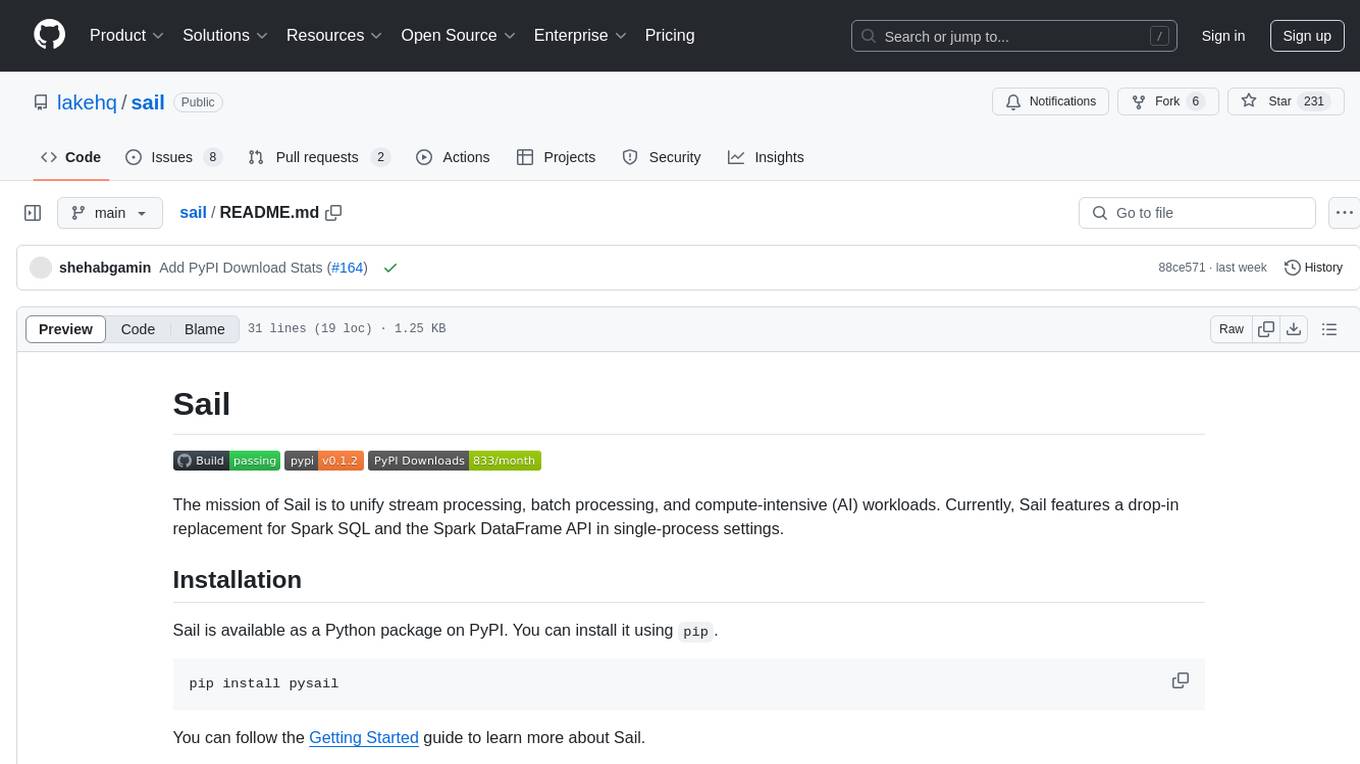
sail
Sail is a tool designed to unify stream processing, batch processing, and compute-intensive workloads, serving as a drop-in replacement for Spark SQL and the Spark DataFrame API in single-process settings. It aims to streamline data processing tasks and facilitate AI workloads.
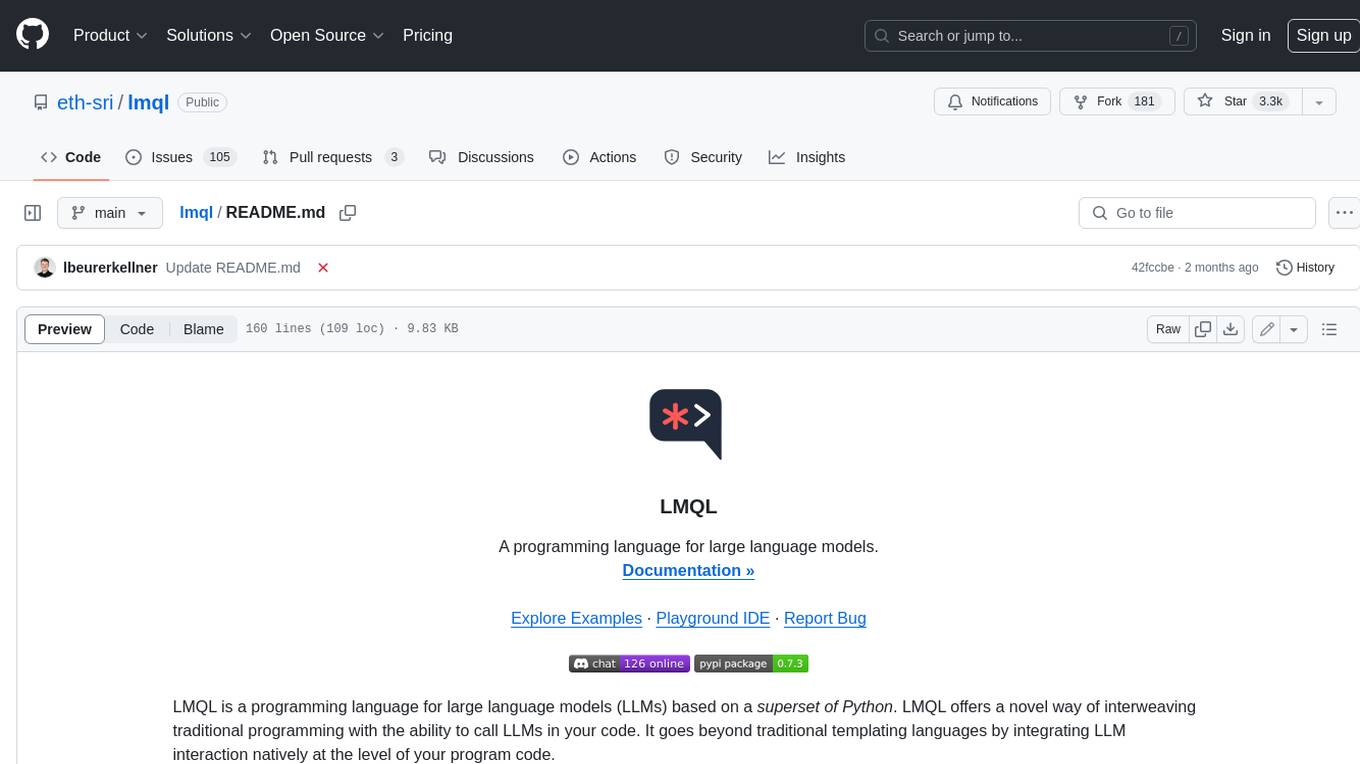
lmql
LMQL is a programming language designed for large language models (LLMs) that offers a unique way of integrating traditional programming with LLM interaction. It allows users to write programs that combine algorithmic logic with LLM calls, enabling model reasoning capabilities within the context of the program. LMQL provides features such as Python syntax integration, rich control-flow options, advanced decoding techniques, powerful constraints via logit masking, runtime optimization, sync and async API support, multi-model compatibility, and extensive applications like JSON decoding and interactive chat interfaces. The tool also offers library integration, flexible tooling, and output streaming options for easy model output handling.
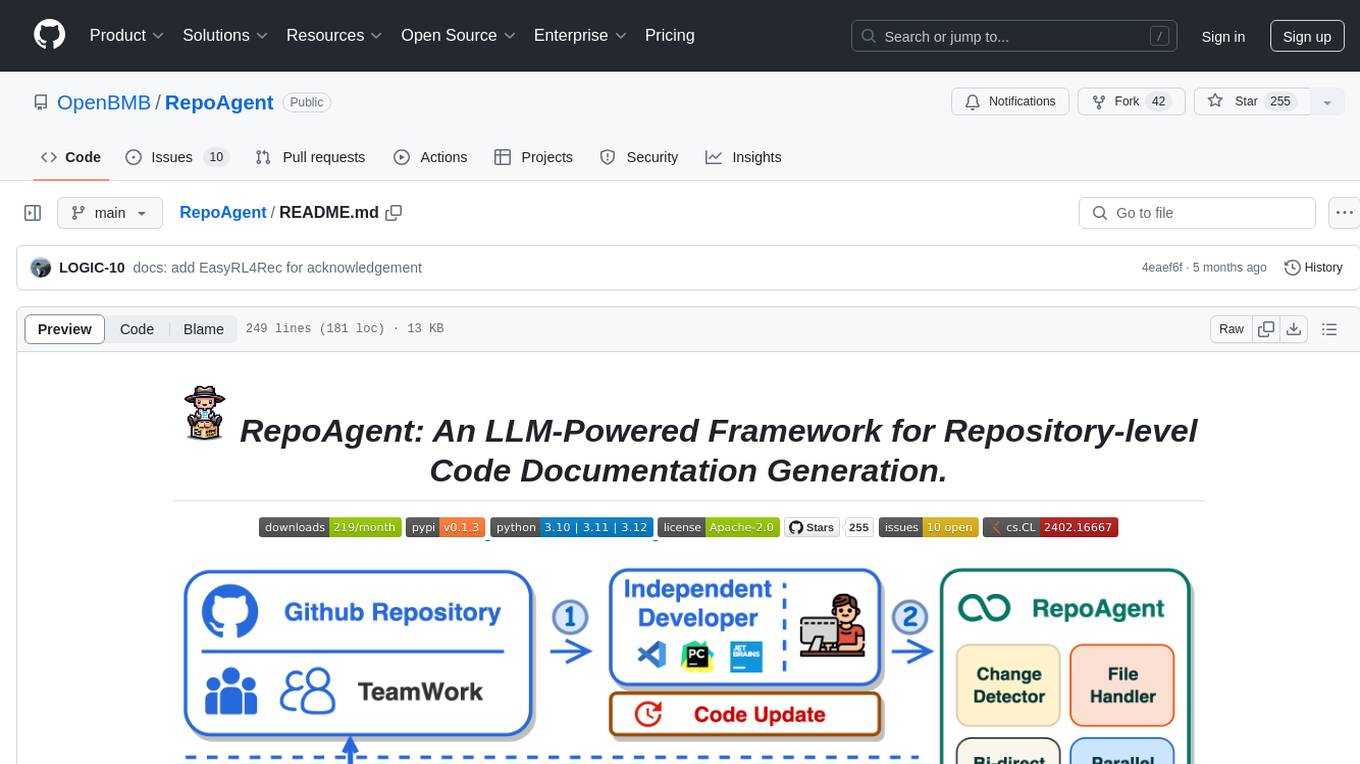
RepoAgent
RepoAgent is an LLM-powered framework designed for repository-level code documentation generation. It automates the process of detecting changes in Git repositories, analyzing code structure through AST, identifying inter-object relationships, replacing Markdown content, and executing multi-threaded operations. The tool aims to assist developers in understanding and maintaining codebases by providing comprehensive documentation, ultimately improving efficiency and saving time.
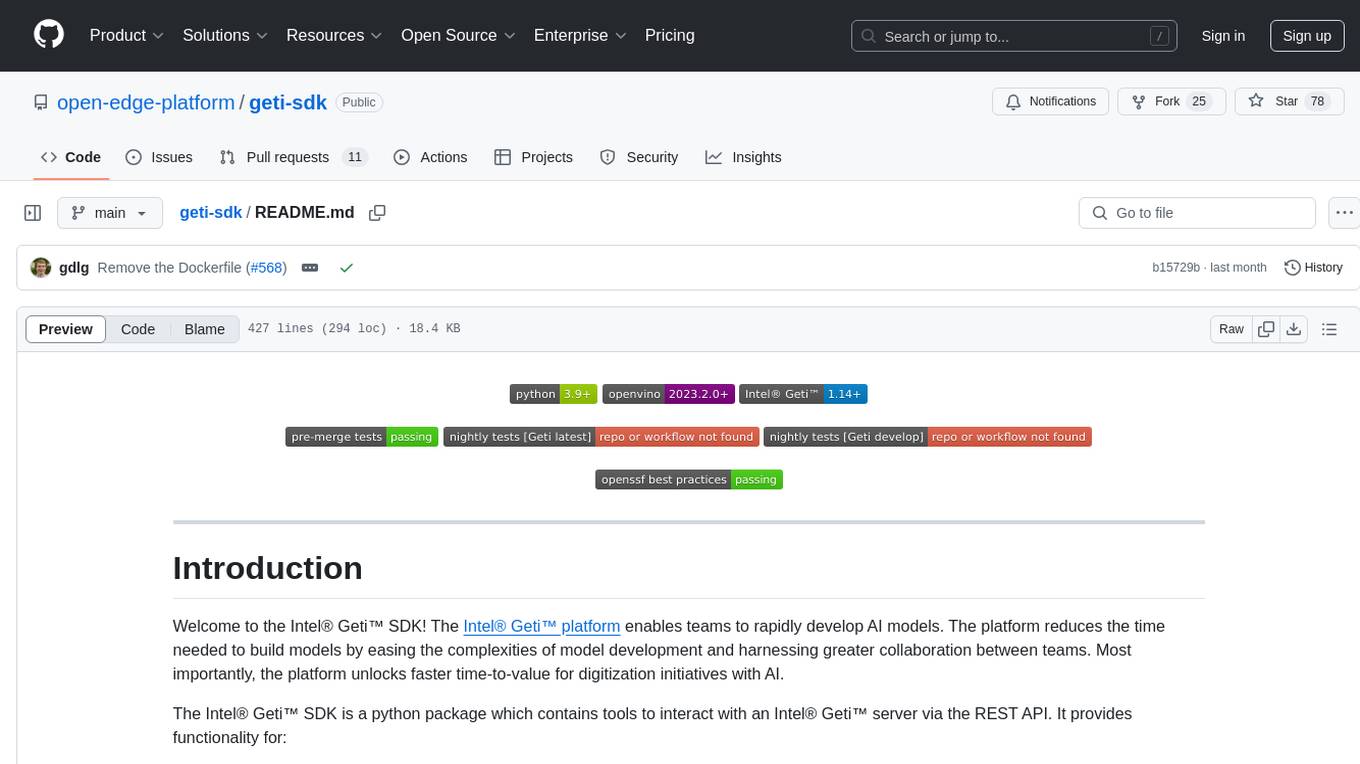
geti-sdk
The Intel® Geti™ SDK is a python package that enables teams to rapidly develop AI models by easing the complexities of model development and fostering collaboration. It provides tools to interact with an Intel® Geti™ server via the REST API, allowing for project creation, downloading, uploading, deploying for local inference with OpenVINO, configuration management, training job monitoring, media upload, and prediction. The repository also includes tutorial-style Jupyter notebooks demonstrating SDK usage.
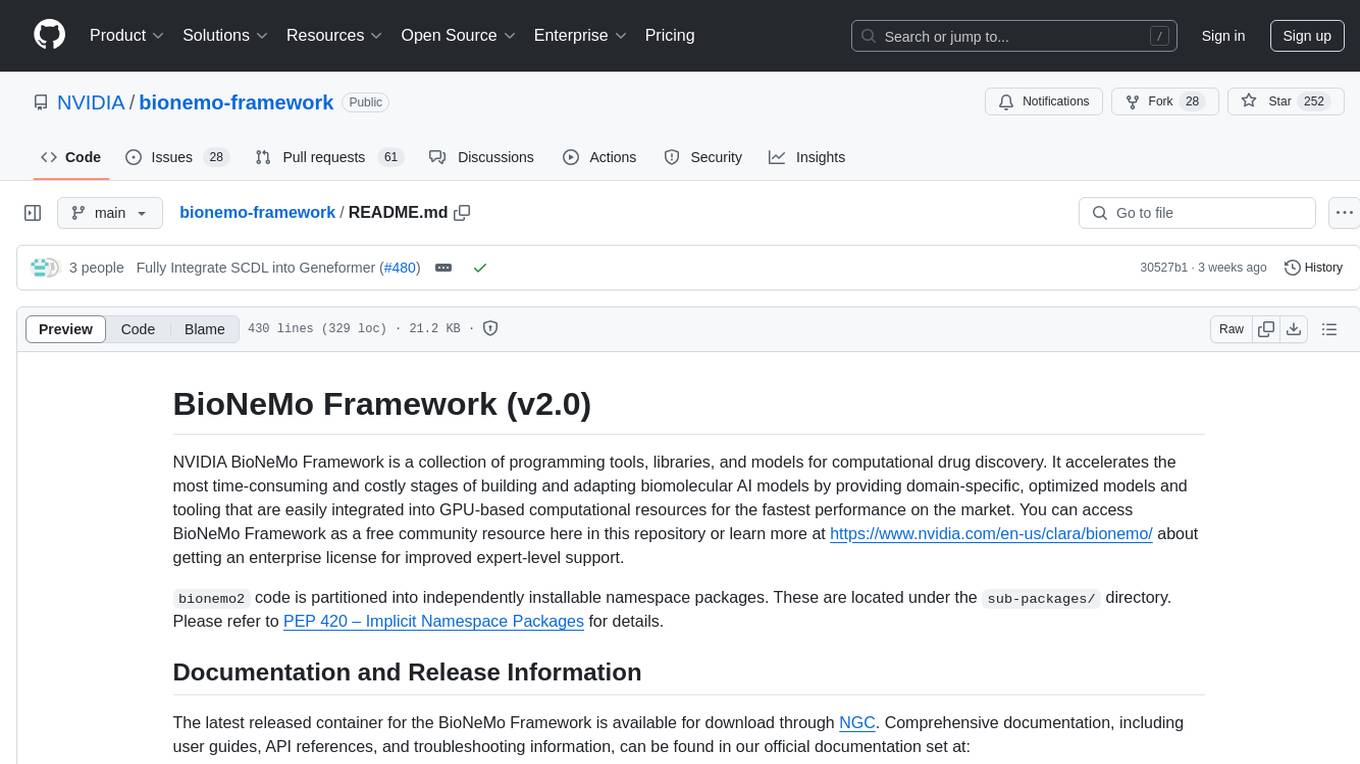
bionemo-framework
NVIDIA BioNeMo Framework is a collection of programming tools, libraries, and models for computational drug discovery. It accelerates building and adapting biomolecular AI models by providing domain-specific, optimized models and tooling for GPU-based computational resources. The framework offers comprehensive documentation and support for both community and enterprise users.
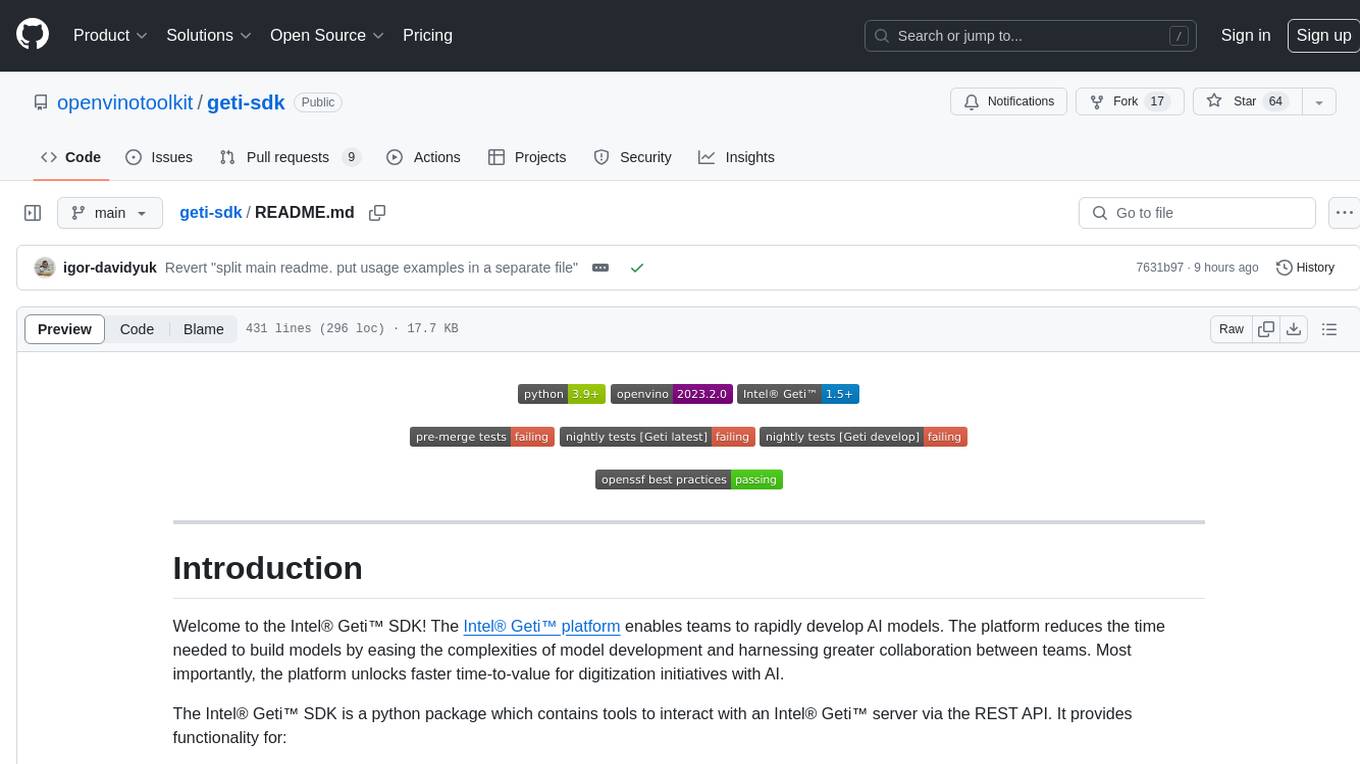
geti-sdk
The Intel® Geti™ SDK is a python package that enables teams to rapidly develop AI models by easing the complexities of model development and enhancing collaboration between teams. It provides tools to interact with an Intel® Geti™ server via the REST API, allowing for project creation, downloading, uploading, deploying for local inference with OpenVINO, setting project and model configuration, launching and monitoring training jobs, and media upload and prediction. The SDK also includes tutorial-style Jupyter notebooks demonstrating its usage.

labelbox-python
Labelbox is a data-centric AI platform for enterprises to develop, optimize, and use AI to solve problems and power new products and services. Enterprises use Labelbox to curate data, generate high-quality human feedback data for computer vision and LLMs, evaluate model performance, and automate tasks by combining AI and human-centric workflows. The academic & research community uses Labelbox for cutting-edge AI research.
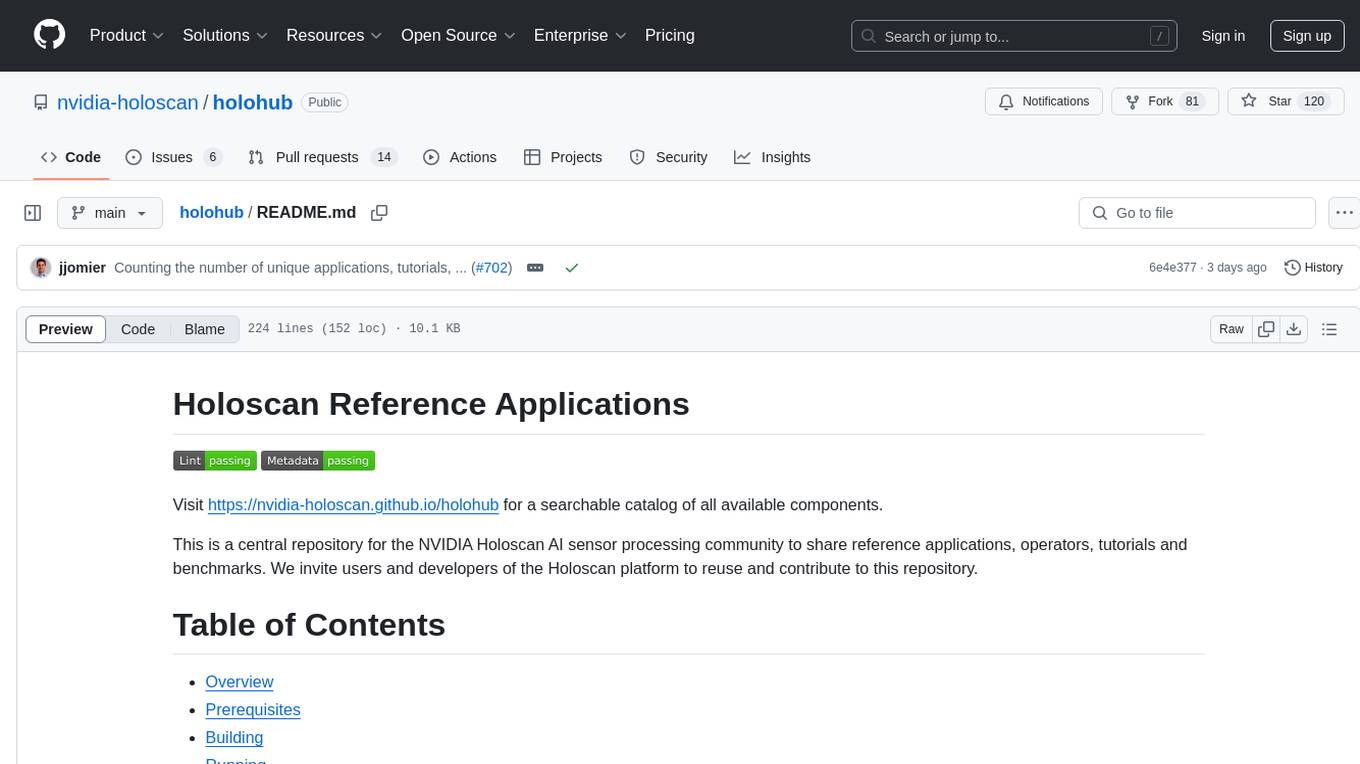
holohub
Holohub is a central repository for the NVIDIA Holoscan AI sensor processing community to share reference applications, operators, tutorials, and benchmarks. It includes example applications, community components, package configurations, and tutorials. Users and developers of the Holoscan platform are invited to reuse and contribute to this repository. The repository provides detailed instructions on prerequisites, building, running applications, contributing, and glossary terms. It also offers a searchable catalog of available components on the Holoscan SDK User Guide website.
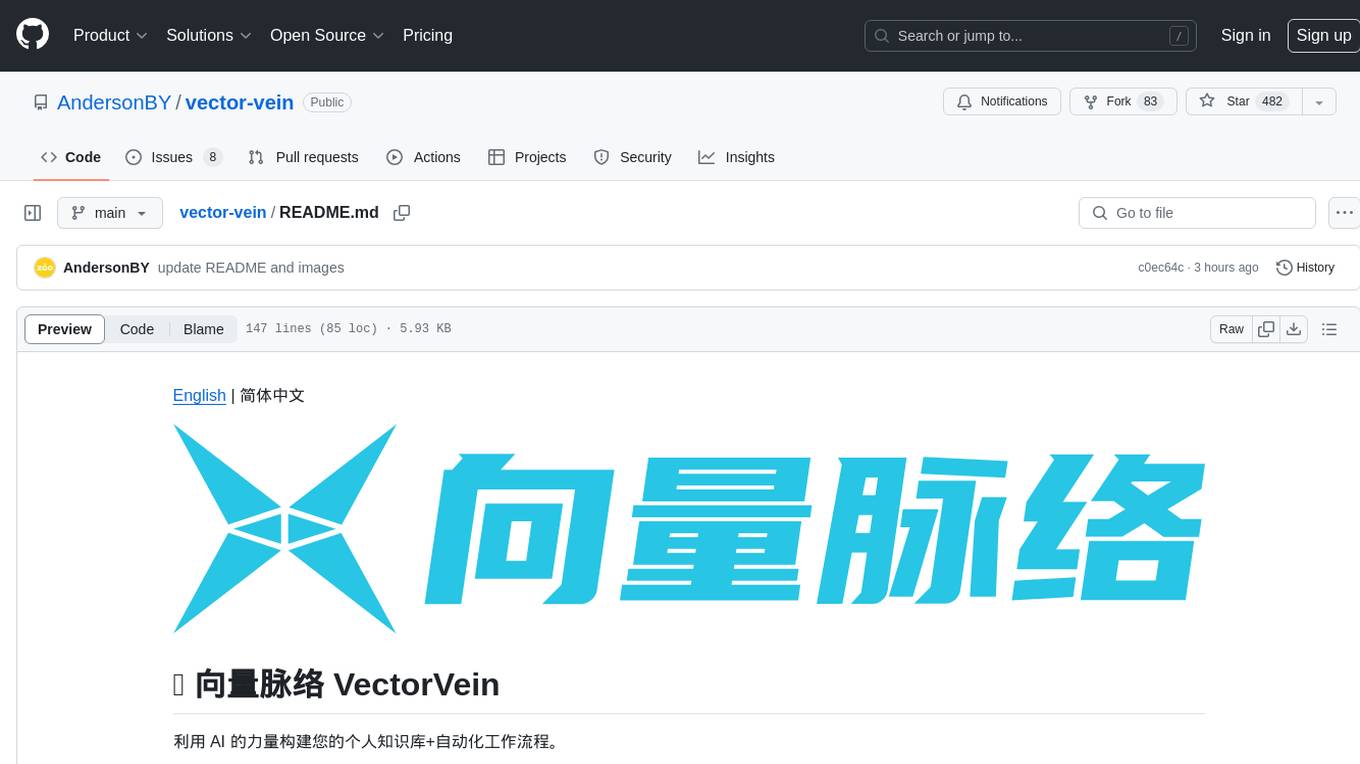
vector-vein
VectorVein is a no-code AI workflow software inspired by LangChain and langflow, aiming to combine the powerful capabilities of large language models and enable users to achieve intelligent and automated daily workflows through simple drag-and-drop actions. Users can create powerful workflows without the need for programming, automating all tasks with ease. The software allows users to define inputs, outputs, and processing methods to create customized workflow processes for various tasks such as translation, mind mapping, summarizing web articles, and automatic categorization of customer reviews.
For similar tasks
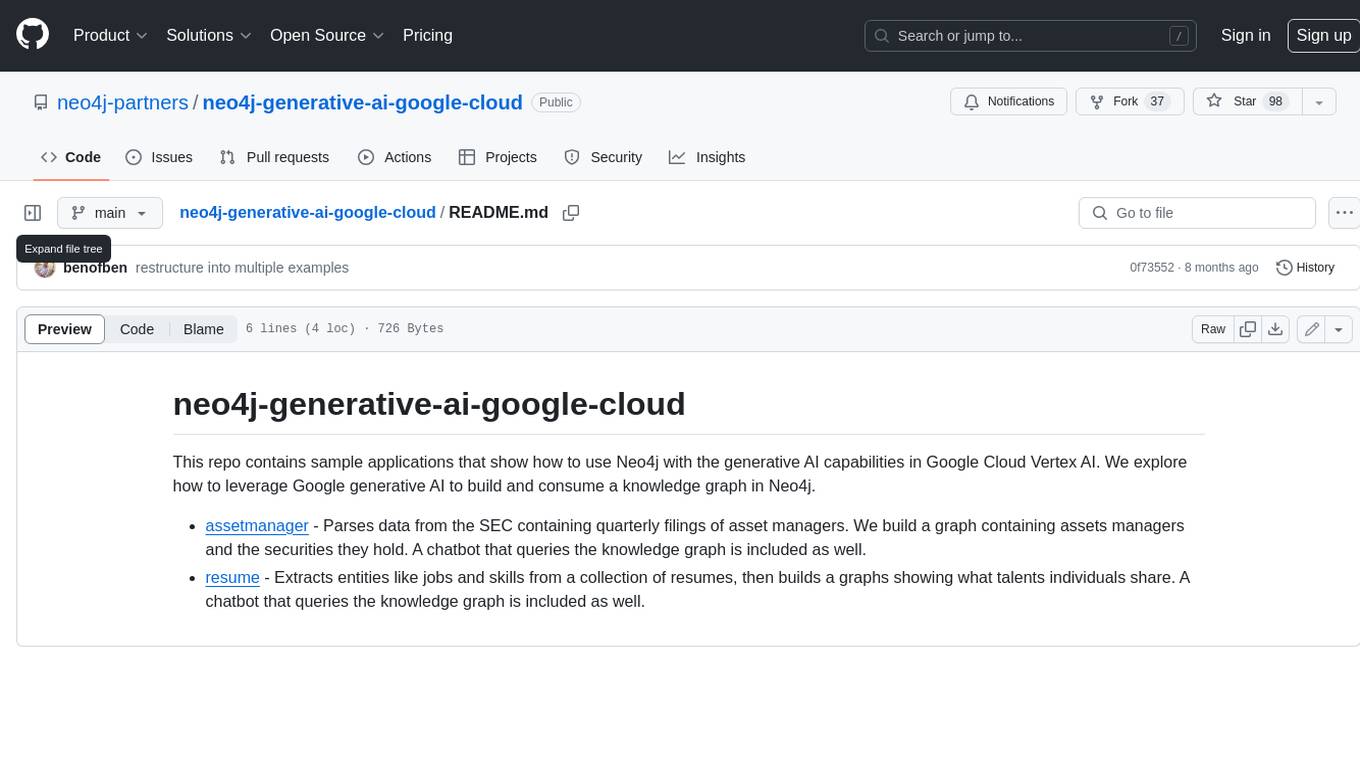
neo4j-generative-ai-google-cloud
This repo contains sample applications that show how to use Neo4j with the generative AI capabilities in Google Cloud Vertex AI. We explore how to leverage Google generative AI to build and consume a knowledge graph in Neo4j.
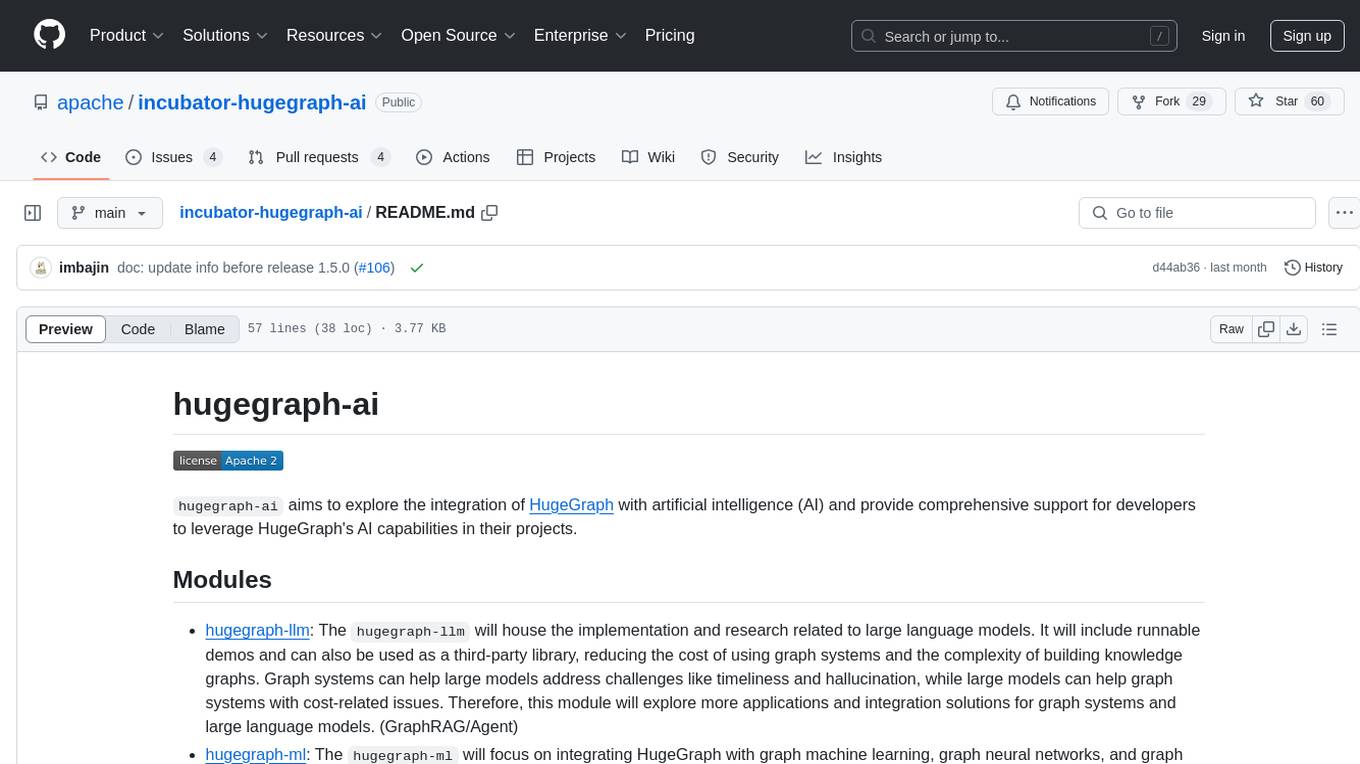
incubator-hugegraph-ai
hugegraph-ai aims to explore the integration of HugeGraph with artificial intelligence (AI) and provide comprehensive support for developers to leverage HugeGraph's AI capabilities in their projects. It includes modules for large language models, graph machine learning, and a Python client for HugeGraph. The project aims to address challenges like timeliness, hallucination, and cost-related issues by integrating graph systems with AI technologies.
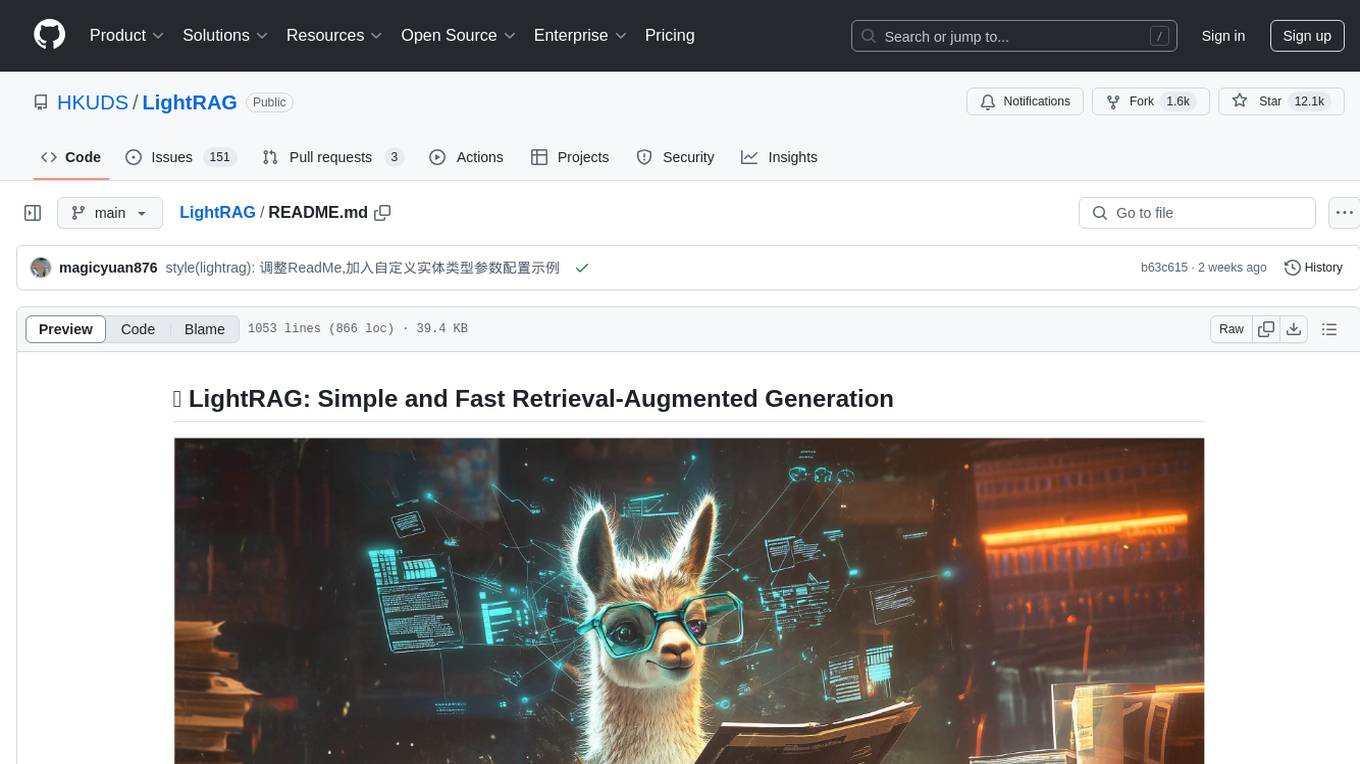
LightRAG
LightRAG is a repository hosting the code for LightRAG, a system that supports seamless integration of custom knowledge graphs, Oracle Database 23ai, Neo4J for storage, and multiple file types. It includes features like entity deletion, batch insert, incremental insert, and graph visualization. LightRAG provides an API server implementation for RESTful API access to RAG operations, allowing users to interact with it through HTTP requests. The repository also includes evaluation scripts, code for reproducing results, and a comprehensive code structure.

graphiti
Graphiti is a framework for building and querying temporally-aware knowledge graphs, tailored for AI agents in dynamic environments. It continuously integrates user interactions, structured and unstructured data, and external information into a coherent, queryable graph. The framework supports incremental data updates, efficient retrieval, and precise historical queries without complete graph recomputation, making it suitable for developing interactive, context-aware AI applications.

sparql-llm
This project provides tools to enhance the capabilities of Large Language Models (LLMs) in generating SPARQL queries for specific endpoints. It includes reusable components, a chat web service, and an experimental MCP server. The system integrates Retrieval-Augmented Generation (RAG) and SPARQL query validation through endpoint schemas to ensure accurate query generation on large-scale knowledge graphs. Components can work independently or as part of a chat-based system requiring endpoint metadata. Features include metadata extraction, SPARQL query validation, deployable chat system, and live example chat system at chat.expasy.org.
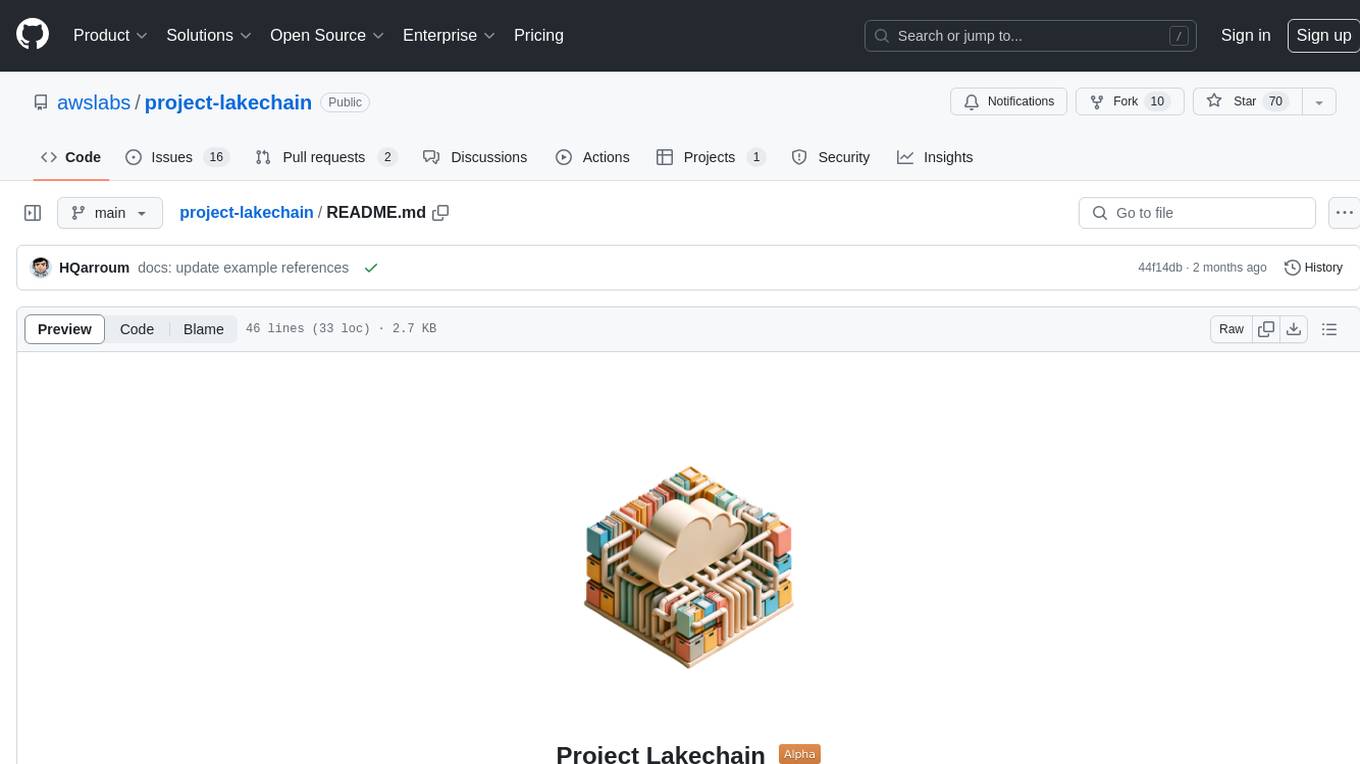
project-lakechain
Project Lakechain is a cloud-native, AI-powered framework for building document processing pipelines on AWS. It provides a composable API with built-in middlewares for common tasks, scalable architecture, cost efficiency, GPU and CPU support, and the ability to create custom transform middlewares. With ready-made examples and emphasis on modularity, Lakechain simplifies the deployment of scalable document pipelines for tasks like metadata extraction, NLP analysis, text summarization, translations, audio transcriptions, computer vision, and more.
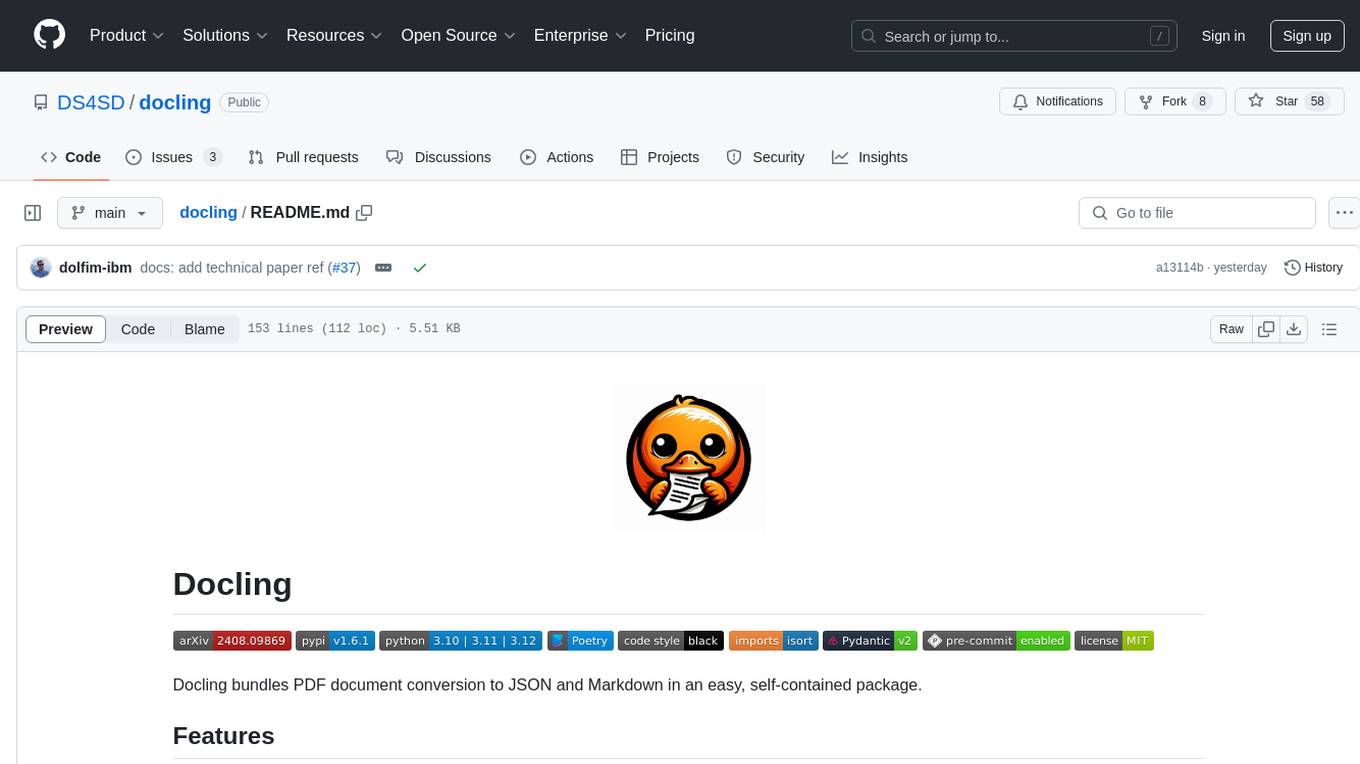
docling
Docling is a tool that bundles PDF document conversion to JSON and Markdown in an easy, self-contained package. It can convert any PDF document to JSON or Markdown format, understand detailed page layout, reading order, recover table structures, extract metadata such as title, authors, references, and language, and optionally apply OCR for scanned PDFs. The tool is designed to be stable, lightning fast, and suitable for macOS and Linux environments.
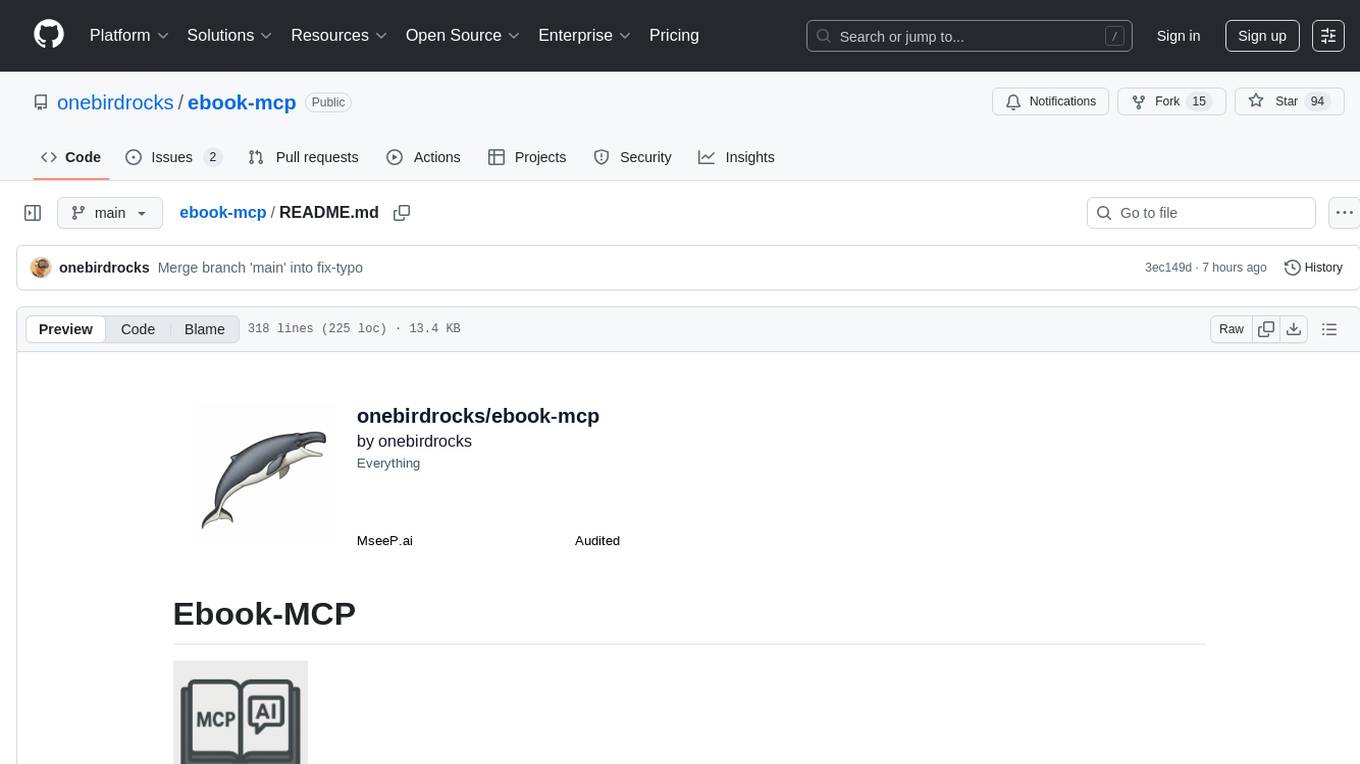
ebook-mcp
Ebook-MCP is a powerful Model Context Protocol (MCP) server designed for processing electronic books. It provides standardized APIs for seamless integration between LLM applications and e-book processing capabilities. The tool supports EPUB and PDF formats, enabling users to manage their digital library, have interactive reading experiences, support active learning, and easily navigate content through natural language queries. By bridging traditional e-books with AI capabilities, Ebook-MCP enhances the value users can extract from their digital reading materials.
For similar jobs

sweep
Sweep is an AI junior developer that turns bugs and feature requests into code changes. It automatically handles developer experience improvements like adding type hints and improving test coverage.

teams-ai
The Teams AI Library is a software development kit (SDK) that helps developers create bots that can interact with Teams and Microsoft 365 applications. It is built on top of the Bot Framework SDK and simplifies the process of developing bots that interact with Teams' artificial intelligence capabilities. The SDK is available for JavaScript/TypeScript, .NET, and Python.

ai-guide
This guide is dedicated to Large Language Models (LLMs) that you can run on your home computer. It assumes your PC is a lower-end, non-gaming setup.

classifai
Supercharge WordPress Content Workflows and Engagement with Artificial Intelligence. Tap into leading cloud-based services like OpenAI, Microsoft Azure AI, Google Gemini and IBM Watson to augment your WordPress-powered websites. Publish content faster while improving SEO performance and increasing audience engagement. ClassifAI integrates Artificial Intelligence and Machine Learning technologies to lighten your workload and eliminate tedious tasks, giving you more time to create original content that matters.

chatbot-ui
Chatbot UI is an open-source AI chat app that allows users to create and deploy their own AI chatbots. It is easy to use and can be customized to fit any need. Chatbot UI is perfect for businesses, developers, and anyone who wants to create a chatbot.

BricksLLM
BricksLLM is a cloud native AI gateway written in Go. Currently, it provides native support for OpenAI, Anthropic, Azure OpenAI and vLLM. BricksLLM aims to provide enterprise level infrastructure that can power any LLM production use cases. Here are some use cases for BricksLLM: * Set LLM usage limits for users on different pricing tiers * Track LLM usage on a per user and per organization basis * Block or redact requests containing PIIs * Improve LLM reliability with failovers, retries and caching * Distribute API keys with rate limits and cost limits for internal development/production use cases * Distribute API keys with rate limits and cost limits for students

uAgents
uAgents is a Python library developed by Fetch.ai that allows for the creation of autonomous AI agents. These agents can perform various tasks on a schedule or take action on various events. uAgents are easy to create and manage, and they are connected to a fast-growing network of other uAgents. They are also secure, with cryptographically secured messages and wallets.

griptape
Griptape is a modular Python framework for building AI-powered applications that securely connect to your enterprise data and APIs. It offers developers the ability to maintain control and flexibility at every step. Griptape's core components include Structures (Agents, Pipelines, and Workflows), Tasks, Tools, Memory (Conversation Memory, Task Memory, and Meta Memory), Drivers (Prompt and Embedding Drivers, Vector Store Drivers, Image Generation Drivers, Image Query Drivers, SQL Drivers, Web Scraper Drivers, and Conversation Memory Drivers), Engines (Query Engines, Extraction Engines, Summary Engines, Image Generation Engines, and Image Query Engines), and additional components (Rulesets, Loaders, Artifacts, Chunkers, and Tokenizers). Griptape enables developers to create AI-powered applications with ease and efficiency.

